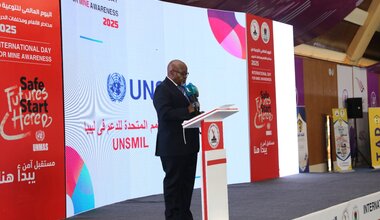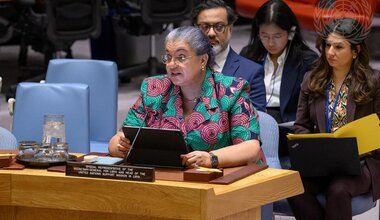SRSG Bathily’s comprehensive approach to elections builds momentum on political and security tracks
The SRSG’s work to support Libya on its path to elections in 2023 and broaden the political process to include a wider scope of actors is underway, he reported 18 April to the Security Council.
The SRSG is engaging key actors through shuttle diplomacy to encourage compromise on key issues blocking progress on elections, and offered the technical expertise of the United Nations Support Mission in Libya to the 6+6 Committee formed by the House of Representatives and the High Council of State to establish electoral laws under Constitutional Amendment 13.
“I urge the leaders of the two chambers to expedite the work of the 6+6 Committee and publish a timebound work programme,” SRSG Bathily said. “For elections to take place this year, the electoral laws must be completed in time for the High National Elections Commission to begin implementing the electoral process by early July.”
In March and April, SRSG Bathily engaged with the Presidential Council, Government of National Unity, High Council of State, House of Representatives and Libyan National Army leaders as well as leaders of the House-of-Representatives-appointed government. In a comprehensive approach, he has also engaged political party leaders, coalitions of political forces, traditional leaders and notables, and women and youth group leaders from all regions of Libya.
“I welcome of the commitment of these actors and call for the translation of their engagement into concrete steps on the ground,” SRSG Bathily told the Security Council.
In addition to expediting elections, the SRSG’s engagements aims to facilitate the adoption of a code of conduct that commits all candidates and stakeholders to engage in elections in a constructive manner and accept the results.
“It is vital for the success of elections that all parts of Libyan society are involved and have their voices heard,” SRSG Bathily said, adding that elections should be a “peaceful competition of visions and programmes” and not “an occasion that triggers hate speech and violence.”
To promote stability and ensure security during and following elections, the SRSG in March also facilitated a series of meetings in Tunis, Tripoli, Benghazi and Sebha between the 5+5 Joint Military Commission and Libyan security and military actors from all three regions of Libya.
“Leaders and representatives of military units and security formations operating in western, eastern and southern Libya committed to support all stages of elections, reject violence throughout Libya, take practical steps for the safe return of internally displaced persons, release detainees and address the missing persons issue in the context of national reconciliation,” SRSG Bathily told the Security Council. “As a result of these consultations, on 8 April 2023, Libyan National Army authorities release six detainees from western Libya as a confidence-building measure.”
Meanwhile, the SRSG continued to push for the removal of foreign fighters and mercenaries from Libya. SRSG Bathily traveled to Sudan, Chad and Niger to secure support from authorities. Under UN auspices, liaison committees from Libya, Sudan, Chad, and Niger also met to discuss strengthening cooperation and establishing an information-sharing mechanism.
In his remarks to the Security Council, SRSG Bathily called on the international community to “remain mobilized a vigilant” to support the moment toward elections. He committed to continue to use his good offices to facilitate progress.
Libyan leaders must deliver on their commitments and “meet the people’s expectation to choose leaders this year,” he said.
Read SRSG Bathily’s full remarks to the security council here.
 United Nations Peacekeeping
United Nations Peacekeeping UN
UN








